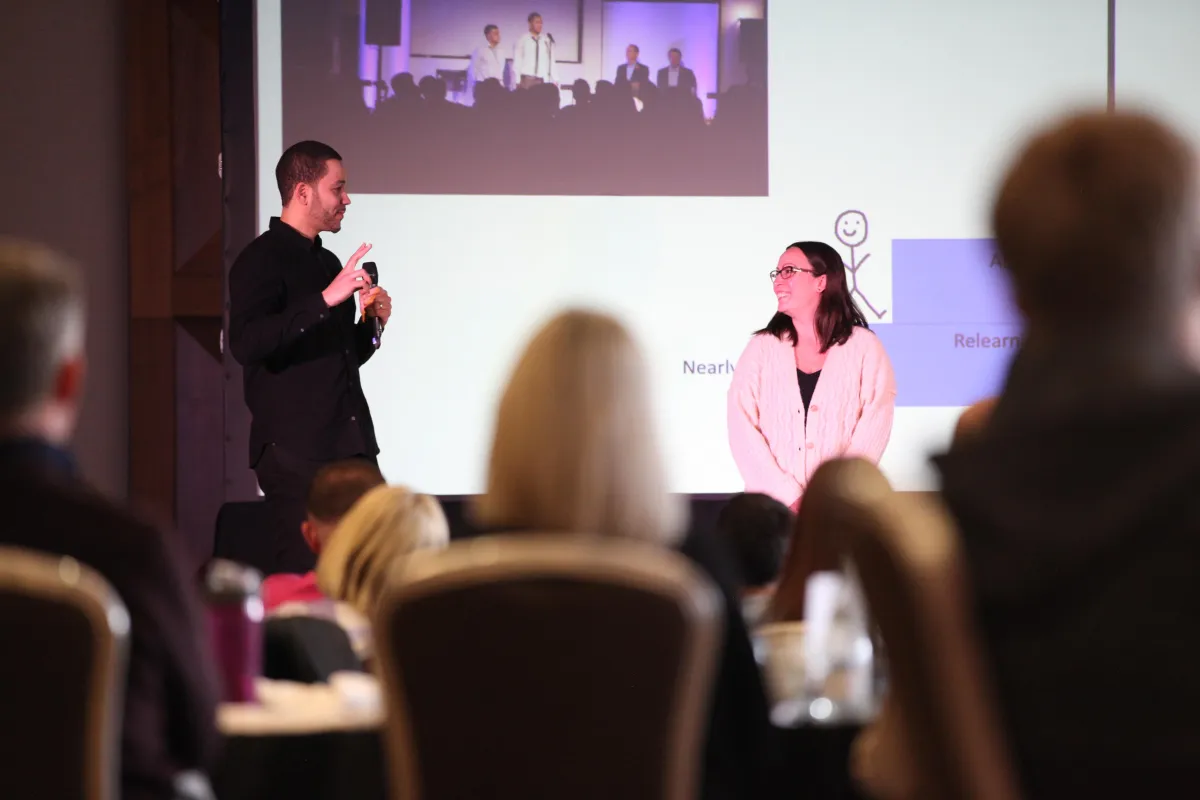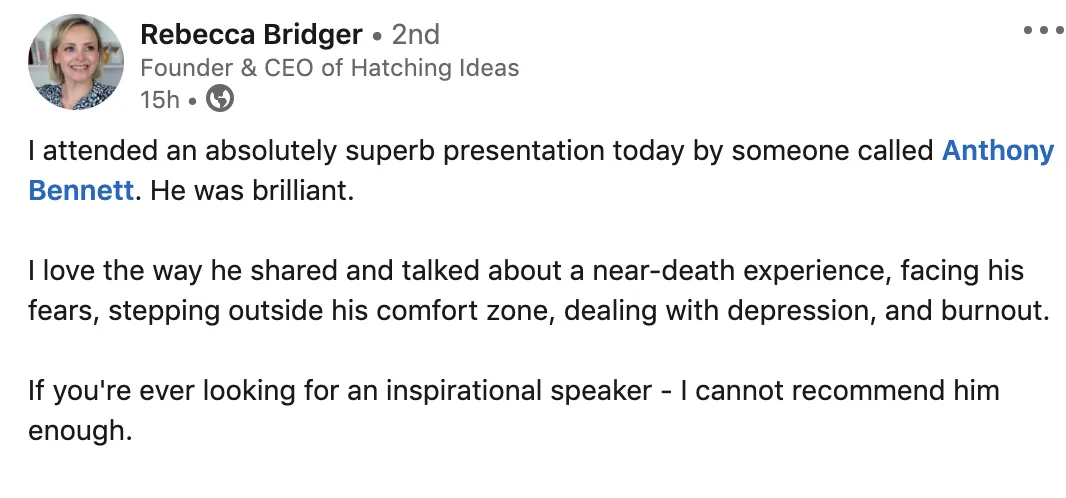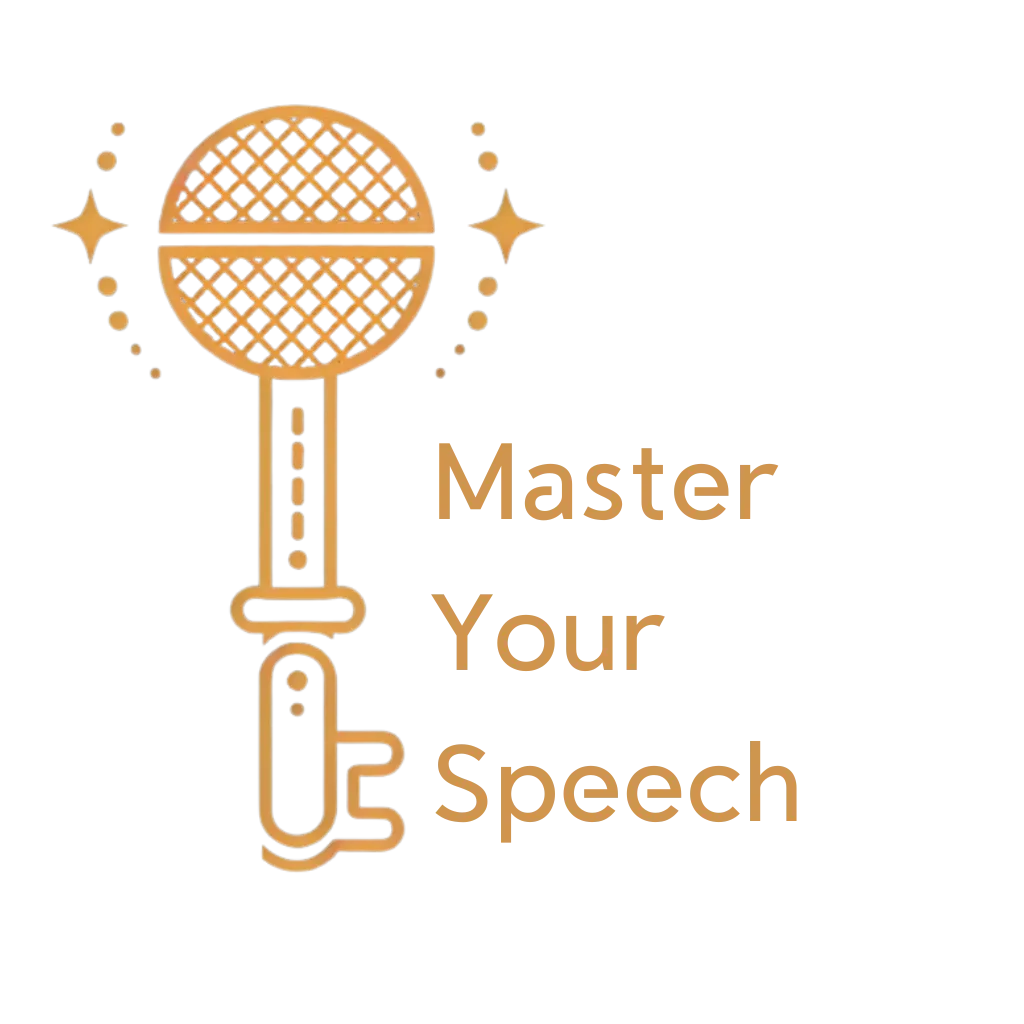Master Your
Speech
The complete course to creating attention grabbing speeches and setting yourself up as a professional speaker.
Learn the art of storytelling
Set yourself up as a professional speaker
Get paid to speak again and again!
Master Your Speech is Launching Summer 2024
Join the Launch Day VIP Mailing List
We will never share your details.

300+ 5* Google Reviews
Master Your
Speech
The complete course on how
to become a paid Speaker
Launching Summer 2024
Can I message you about the launch date?
We will never share your details.
Your Journey Begins Here
Master Your Speech Courses
8 Module video course
£1,499

8 Modules | 93 Video Lessons
1 year access (£14/month after)
Plus access to the Master Your Speech video platform and network for 1 year. (£14/month after 1 year)
Coached by Anthony
£1,999

8 Modules | 93 Video Lessons
3x 45minute Coaching Calls
1 year (£14/month after)
3x virtual coaching calls with Anthony
Plus access to the Master Your Speech video course platform and network for 1 year. (Usually £14/Month)
Two-day workshop
£2,499

In-person
2 day workshop + 1 Year access to course platform (£14/month after)
Food and accommodation provided
Includes one free spa and treatment pass per person
Plus access to the Master Your Speech video course platform and network for 1 year. (Usually £14/Month)
Master Your Speech
is suitable for the following speaker levels

First time speakers
that want to become better communicators by delivering their points more effectively

Experienced Speakers
who find themselves too comfortable at their current speaker level and want more tools in their toolbox.

Achievers/Overcomers
that have overcome adversities in their life and now want to share their story and teach people how they can too.
An Inside Look of Master Your Speech

An Intro To Public Speaking
Module 1
Lesson 1
The importance of public speaking in personal and professional life
Lesson 2
The difference between public speaking and other forms of communication
Lesson 3
How to choose a topic for a speech
Lesson 4
Knowing your audience
Lesson 5
How to research and prepare a speech
Lesson 6
Tips for creating engaging and memorable content
Lesson 7
Handling nerves
Lesson 8
The role of visual aids in a speech

Creating a Compelling Presentation
Module 2
Lesson 1
The importance of having a clear and compelling message in a keynote speech
Lesson 2
Tips for creating an attention-grabbing opening and a memorable closing
Lesson 3
Techniques for structuring your speech to maximise impact
Lesson 4
The role of humour and how to use it appropriately in a keynote speech
Lesson 5
The importance of incorporating data and facts to support your message
Lesson 6
Tips for using visuals aids, such as slides or videos, to enhance your presentation
Lesson 7
Techniques for using body language, vocal variety, and other nonverbal communication to enhance your message
Lesson 8
The importance of rehearsing your speech to ensure a smooth delivery
Lesson 9
Strategies for handling nerves and anxiety when delivering a keynote speech
Lesson 10
How to adapt your presentation style to different audiences and venues
Lesson 11
The importance of feedback and continuous improvement in developing and delivering a successful keynote speech.

Captivate Your Audience
Module 3
Lesson 1
The importance of building a connection with your audience
Lesson 2
Techniques for engaging your audience from the beginning of your speech
Lesson 3
How to use rhetorical questions and other engagement techniques to keep your audience interested
Lesson 4
The role of body language and eye contact in connecting with your audience
Lesson 5
How to read and respond to your audience's nonverbal cues
Lesson 6
Techniques for using audience participation and interaction to keep your audience engaged
Lesson 7
The role of storytelling and anecdotes in captivating your audience
Lesson 8
How to create a sense of suspense or anticipation in your presentation
Lesson 9
The importance of being authentic and relatable to your audience
Lesson 10
How to adapt your presentation style to different audience demographics and cultures
Lesson 11
Strategies for dealing with distractions and disruptions during your presentation
Lesson 12
The role of technology and multimedia in captivating your audience
Lesson 13
Tips for using vocal variety and pacing to maintain audience engagement

Storytelling and Impact
Module 4
Lesson 1
How to Identify and Craft Compelling Stories That Support Your Message"
Lesson 2
Techniques for Structuring Stories Within Your Speech
Lesson 3
The Importance of Using Authentic and Relatable Stories in Your Keynote Speech
Lesson 4
Strategies for Handling Sensitive or Emotional Topics within Storytelling
Lesson 5
Tips for Using Pauses and Silence to Enhance Impact in Storytelling
Lesson 6
How to Use Storytelling to Inspire Action and Change in Your Audience
Lesson 7
The Importance of Authenticity and Vulnerability in Storytelling
Lesson 8
Strategies for Handling Sensitive or Emotional Topics within Storytelling
Lesson 9
Tips for Using Pauses and Silence to Enhance Impact in Storytelling
Lesson 10
How to Use Storytelling to Inspire Action and Change in Your Audience

Finding Speaking Opportunities
Module 5
Lesson 1
Understanding the market for keynote speaking opportunities
Lesson 2
How to identify potential speaking opportunities and target audiences
Lesson 3
Techniques for researching and finding speaking opportunities online and offline
Lesson 4
How to create a speaker one-sheet to market yourself to event planners and organisers
Lesson 5
Strategies for networking and building relationships within the speaking industry
Lesson 6
The importance of creating a compelling speaker proposal for potential speaking engagements
Lesson 7
Tips for creating a speaker reel or demo video to showcase your speaking style and content
Lesson 8
How to work with speaker bureaus and agencies to secure speaking engagements
Lesson 9
Techniques for negotiating speaking fees and contracts with event organizers.
Lesson 10
The importance of building a strong reputation and brand as a keynote speaker
Lesson 11
How to leverage social media and other marketing channels to find speaking opportunities
Lesson 12
Strategies for building and maintaining relationships with past clients for repeat business
Lesson 13
The role of industry conferences and events in finding speaking opportunities
Lesson 14
The Importance of Continuous Marketing and Self-Promotion to Maintain a Steady Stream of Speaking Engagements

Making a living as a speaker
Module 6
Lesson 1
Understanding the business side of public speaking
Lesson 2
Determining your worth as a speaker
Lesson 3
Developing a pricing strategy
Lesson 4
Creating a speaker one-sheet
Lesson 5
Crafting a killer speaker proposal
Lesson 6
Discover different ways to find speaking opportunities and learn how to prioritise them based on your goals and objectives
Lesson 7
Developing a speaking portfolio
Lesson 8
Negotiating speaking contracts
Lesson 9
Preparing for speaking engagements
Lesson 10
Learn how to deliver a great speech that will leave a lasting impression on your audience and make event planners want to book you again
Lesson 11
Discover how to leverage your speaking engagements to build your brand, increase your visibility, and attract new clients
Lesson 12
Diversifying your income streams - Learn how to diversify your income streams by offering different products and services related to your speaking career
Lesson 13
Building and nurturing relationships - Understand the importance of building and nurturing relationships with event planners, fellow speakers, and other industry professionals
Lesson 14
Learn how to invest in your professional development by attending conferences, workshops, and other events that will help you improve your skills and knowledge as a speaker

Delivering Impactful Presentations
Module 7
Lesson 1
Crafting a clear and concise message - Learn how to craft a message that is clear, concise, and resonates with your audience
Lesson 2
Understanding your audience and how to tailor your message to their specific needs and interests
Lesson 3
Learn how to create compelling visuals that support your message and enhance the overall impact of your presentation
Lesson 4
Managing nervousness and anxiety - Learn strategies to manage nervousness and anxiety, including visualisation, breathing exercises, and other techniques
Lesson 5
Handling questions and objections - Learn how to handle questions and objections from your audience in a confident and professional manner
Lesson 6
Building rapport with your audience - Discover the importance of building rapport with your audience and learn how to create a connection with them through your presentation
Lesson 7
Learn how to manage your time effectively during your presentation to ensure that you cover all of your key points and keep your audience engaged
Lesson 8
Understand how to use technology effectively, including slides, videos, and other visual aids, to enhance your presentation
Lesson 9
Evaluating your performance - Understand the importance of evaluating your performance after your presentation and learn how to use feedback to improve your future presentations

The Business Side of Public Speaking
Module 8
Lesson 1
Understanding the legal aspects of public speaking - Learn about the legal aspects of public speaking, including contracts, liability, and intellectual property
Lesson 2
Setting up a business entity - Understand the different types of business entities and learn how to set up a business entity for your speaking career
Lesson 3
Understand the importance of managing your finances as a speaker and learn strategies for budgeting, invoicing, and tracking expenses
Lesson 4
Discover different payment systems that you can use for your speaking services and learn how to set them up effectively
Lesson 5
Learn different pricing strategies that you can use to maximise your income as a speaker, including hourly rates, flat fees, and value-based pricing
Lesson 6
Developing a marketing strategy - Understand the importance of developing a marketing strategy and learn different marketing tactics that you can use to promote your speaking services
Lesson 7
Building a website and social media presence - Learn how to build a website and social media presence that showcases your expertise and attracts potential clients
Lesson 8
Networking and building relationships - Understand the importance of networking and building relationships with event planners, fellow speakers, and other industry professionals
Lesson 9
Developing a sales funnel - Learn how to develop a sales funnel that attracts potential clients, educates them about your services, and converts them into paying clients
Lesson 10
Discover the importance of building an email list and learn how to build and manage an email list effectively
Lesson 11
Understand how to create and sell products related to your speaking services, including books, courses, and other digital products
Lesson 12
Learn how to manage client relationships effectively, including communicating effectively, setting boundaries, and managing expectations
Lesson 13
Understand different strategies for scaling your speaking business, including hiring employees, outsourcing tasks, and leveraging technology
Lesson 14
Learn how to stay current with industry trends and evolving your skills and services to stay competitive in the market
Hey, I'm Anthony
I kicked off my speaking journey not really knowing where to begin or how to piece together this 'public speaking thing' I had stumbled into and really enjoyed.
From 2008 'till now, my speaking work has boomed, with international talks and speaking opportunities with some big names.
Perhaps you've been speaking for free, feeling slightly lost on who to reach out to and how to reach them. Or maybe you're overflowing with ideas but unsure how to weave them into a transformative message.
I can help you.
2006
Fell extremely sick after returning from a school trip to Disneyland Paris
2008
Made a full recover and was asked to share my story to Morgan Stanley
2012
Played a major role in securing a £7.5m charity partnership
2015
Named one of the happiest people in the UK
2017
Launch of Anthony Inspires Ltd and became a full time speaker
2023
8 countries
300+ 5* Google Reviews
100s of bookings
2024
Launch of Master Your Speech. Taking what I've learnt and helping others to get to the stage!
I've been invited to speak with teams from









ANSWERS TO YOUR JOURNEY
HOW I’LL HELP YOU + WHAT TO EXPECT OF YOU
HOW LONG DOES IT TAKE TO BUILD A SUCCESSFUL SPEAKING CAREER?
Building a successful speaking career can vary greatly from person to person, but on average, it typically takes several years of dedicated effort. Here are some key factors that influence the timeline:
Experience and Expertise: Speakers with extensive experience and recognised expertise in their field may progress more quickly. Establishing credibility is crucial.
Networking and Relationships: Building a network of contacts in the industry can accelerate your career. This includes relationships with event organizers, other speakers, and industry influencers.
Marketing and Branding: Effective self-promotion and personal branding are essential. This involves maintaining a professional website, active social media presence, and a portfolio of speaking engagements.
Skill Development: Continuously improving your speaking skills through practice, feedback, and professional training can help you stand out and secure more opportunities.
Audience Engagement: Developing the ability to engage and resonate with your audience can lead to more referrals and repeat engagements, which are key to long-term success.
For most people, reaching a point where they can sustain themselves solely through speaking engagements often takes about 3 to 5 years. However, some may achieve this sooner with intensive effort and the right opportunities, while for others, it may take longer.
HOW LONG DOES IT TAKE TO DEVELOP MY GO-TO SPEECH?
Developing your go-to speech can vary depending on several factors, but generally, it takes a few weeks to several months. Here are the key steps and factors involved:
Topic Selection and Research: Choosing a compelling topic and conducting thorough research can take anywhere from a few days to a few weeks.
Drafting the Speech: Writing the initial draft of your speech typically takes a few days to a couple of weeks, depending on the length and complexity.
Revisions and Refinements: Refining your speech for clarity, impact, and flow involves multiple rounds of revisions and can take several weeks.
Practicing Delivery: Practicing your delivery, including timing, tone, and body language, is crucial. This stage often takes a few weeks as you refine your performance and make adjustments based on feedback.
Audience Testing: Testing your speech on small, friendly audiences and incorporating their feedback can take a few weeks. This helps in fine-tuning your message and delivery.
Final Adjustments: Making final tweaks based on feedback and personal assessment to ensure your speech is polished and impactful.
HOW LONG DOES IT TAKE FOR ME TO GET A PAID SPEAKING GIG?
Securing your first paid speaking gig can vary greatly depending on your experience, network, and marketing efforts. On average, it typically takes several months to a few years. Here are the key factors that influence this timeline:
Building Expertise and Credibility: Establishing yourself as an expert in your field and building a credible reputation can take several months to years, depending on your background and the niche you are targeting.
Networking and Connections: Developing a network of contacts in the speaking industry, including event organizers, other speakers, and industry professionals, can significantly shorten the time to get a paid gig. This can take several months of consistent effort.
Marketing and Branding: Creating a professional online presence, including a website, social media profiles, and a portfolio of speaking engagements, is crucial. Effective marketing and branding can take a few months to establish.
Speaking for Free or Low Fees Initially: Many speakers start by speaking for free or at low fees to build their portfolio and gain experience. This stage can last several months to a couple of years before transitioning to paid gigs.
Audience Engagement and Feedback: Demonstrating the ability to engage and resonate with your audience through positive feedback and testimonials can help attract paid opportunities more quickly.
I JUST STARTED SPEAKING, IS THIS FOR ME?
If you just started speaking, pursuing a speaking career can absolutely be for you, but it depends on several factors and personal considerations. Here are some points to consider:
Passion and Commitment: If you are passionate about your topic and committed to continuous improvement, speaking can be a rewarding career or hobby.
Willingness to Learn: Starting out means there is a lot to learn about crafting your message, engaging with audiences, and improving your delivery. Being open to feedback and eager to learn is crucial.
Networking: Building connections with other speakers, event organizers, and industry professionals is essential. If you enjoy networking and building relationships, this can be a good fit for you.
Building Experience: Initially, you may need to speak for free or for low fees to build your experience and credibility. If you are patient and willing to invest time in building your portfolio, speaking can be a great fit.
Marketing yourself: Successful speakers often need to market themselves effectively. If you are comfortable promoting yourself and building a personal brand, you have the potential to succeed in this field.
Flexibility and Resilience: The speaking industry can be competitive and unpredictable. Being flexible with opportunities and resilient in the face of setbacks is important.
I'VE BEEN SPEAKING FOR A WHILE AS A PART TIME SPEAKER, IS THIS FOR ME?
If you’ve been speaking part-time and are considering transitioning to a more dedicated speaking career, it could definitely be the right path for you. Here are some factors to consider:
Passion and Satisfaction: Reflect on whether speaking brings you joy and fulfillment. If you are passionate about sharing your knowledge and experiences, it might be a sign that a full-time speaking career is a good fit.
Experience and Feedback: Consider the feedback you’ve received from your audiences. Positive feedback and repeat invitations are strong indicators that you have the potential to succeed in a more committed role.
Financial Viability: Evaluate whether your part-time speaking engagements could be scaled up to provide a sustainable income. Look at potential revenue streams such as higher speaking fees, workshops, and online courses.
Market Demand: Research the demand for speakers in your niche. If there is a growing or stable demand for your expertise, it might be a good time to transition to more frequent engagements.
Networking and Opportunities: Assess your network and the opportunities available to you. A strong network can help you secure more gigs and navigate the transition more smoothly.
Skill and Development: Think about whether you have been actively improving your speaking skills and whether you are prepared to invest further in professional development.
Work-Life Balance: Consider how transitioning to more speaking engagements will affect your work-life balance. Ensure that you have the support and resources needed to handle increased travel and preparation time.
ONCE ENROLLED, HOW CAN I ACCESS THE PROGRAM?
Once enrolled, accessing the program is straightforward. Here’s a step-by-step guide:
Confirmation Email: After enrollment, you will receive a confirmation email. This email will contain important details such as your login credentials, a link to the program’s platform, and any additional instructions.
Login to the Platform: Follow the link provided in the confirmation email to reach the program’s platform.
Enter the login credentials (username and password) that were provided in the confirmation email.
Dashboard Navigation: Once logged in, you will be directed to your personal dashboard. This dashboard is the central hub for accessing all program materials, schedules, and resources.
Your speaking dream is possible.
Could you imagine

Waking up
to companies messaging you, asking YOU to be their keynote speaker.

Travelling
to new places, meeting new people, trying new food, all while doing something you love!

Learning
the art of storytelling and communicating with large groups of people.

Owning
more of your time so you can use it to do the things that bring you joy and make you happy.
Feedback and Reviews

300+ 5* Google reviews











Launching Summer 2024
Reserve your space
We will never share your details.









